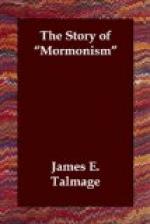In reading the earliest pages of “Mormon” history, we are introduced to a man whose name will ever be prominent in the story of the Church—the founder of the organization by common usage of the term, the head of the system as an earthly establishment—one who is accepted by the Church as an ambassador specially commissioned of God to be the first revelator of the latter-day dispensation. This man is Joseph Smith, commonly known as the “Mormon” prophet. Rarely indeed does history present an organization, religious, social, or political, in which an individual holds as conspicuous and in all ways as important a place as does this man in the development of “Mormonism.” The earnest investigator, the sincere truth-seeker, can ignore neither the man nor his work; for the Church under consideration has risen from the testimony solemnly set forth and the startling declarations made by this person, who, at the time of his earliest announcements, was a farmer’s boy in the first half of his teens. If his claims to ordination under the hands of divinely commissioned messengers be fallacious, forming as they form the foundation of the Church organization, the superstructure cannot stand; if, on the other hand, such declarations be true, there is little cause to wonder at the phenomenally rapid rise and the surprising stability of the edifice so begun.
Joseph Smith was born at Sharon, Vermont, in December, 1805. He was the son of industrious parents, who possessed strong religious tendencies and tolerant natures. For generations his ancestors had been laborers, by occupation tillers of the soil; and though comfortable circumstances had generally been their lot, reverses and losses in the father’s house had brought the family to poverty; so that from his earliest days the lad Joseph was made acquainted with the pleasures and pains of hard work. He is described as having been more than ordinarily studious for his years; and when that powerful wave of religious agitation and sectarian revival which characterized the first quarter of the last century, reached the home of the Smiths, Joseph with others of the family was profoundly affected. The household became somewhat divided on the subject of religion, and some of the members identified themselves with the more popular sects; but Joseph, while favorably impressed by the Methodists in comparison with others, confesses that his mind was sorely troubled over the contemplation of the strife and tumult existing among the religious bodies; and he hesitated. He tried in vain to solve the mystery presented to him in the warring factions of what professed to be the Church of Christ. Surely, thought he, these several churches, opposed as they are to one another on what appear to be the vital points of religion, cannot all be right. While puzzling over this anomaly he chanced upon this verse in the epistle of St. James:
“If any of you lack
wisdom, let him ask of God, that
giveth to all men liberally,
and upbraideth not; and
it shall be given him.”




